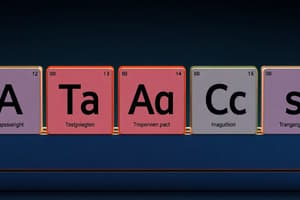Podcast
Questions and Answers
What is the term for the outer covering that protects the innermost parts of an object?
What is the term for the outer covering that protects the innermost parts of an object?
- fusion
- core
- gravity
- shell (correct)
Which term describes the force that causes objects to be attracted to one another?
Which term describes the force that causes objects to be attracted to one another?
- compression
- gravity (correct)
- release
- expansion
What does the word 'inward' signify in terms of movement?
What does the word 'inward' signify in terms of movement?
- Moving towards the outer boundary
- Moving in a circular direction
- Moving toward the inside of something (correct)
- Moving away from a center point
Which of the following best defines 'fusion'?
Which of the following best defines 'fusion'?
What does it mean for something to be described as 'dense'?
What does it mean for something to be described as 'dense'?
Flashcards are hidden until you start studying
Study Notes
Geometry and Physics Concepts
- A sphere is a round shape resembling a ball, commonly found in nature and used in various applications like sports and design.
- Gravity is the force that attracts objects toward each other, fundamental to the movement of celestial bodies and everyday items on Earth.
Motion and Energy
- Inward movement refers to the action of moving toward the inside of an object or space.
- Extreme conditions reflect very high or significant effects, often seen in natural phenomena.
- Compression involves reducing the size of an object or substance, relevant in fields like physics and engineering.
Structure and Composition
- The core of an object is its central part, crucial for understanding its properties, especially in planetary science.
- Fusion describes the joining together of elements or compounds, a key process in nuclear physics and stars' energy production.
Dynamics of Matter
- Release means to let go or emit something, applicable in chemical reactions and physical processes.
- Maintaining a state means to keep an object or condition unchanged over time, important in systems requiring stability.
Characteristics of Matter
- Constant defines something that does not change; in physics, it can refer to fundamental forces or properties.
- A shell is the protective outer layer of an object, commonly found in biological organisms and structures.
Space and Expansion
- Surrounding implies being encircled by something, highlighting spatial relationships between objects.
- Expansion refers to the process of becoming larger or spreading out, essential for understanding reactions in gases and thermal dynamics.
Foundations and Size
- To begin with indicates the original state or starting point of a process, vital for historical and scientific contexts.
- Dense describes materials with closely packed components, affecting mass, weight, and other physical properties.
- Massive indicates something of very large size or degree, often used in environmental science to describe scale.
Energy Release and Classification
- An explosion is a sudden burst of energy, usually resulting in significant physical changes, vital in both natural events and human-made situations.
- Categories group similar entities together, facilitating understanding and organization in science and everyday life.
Studying That Suits You
Use AI to generate personalized quizzes and flashcards to suit your learning preferences.




